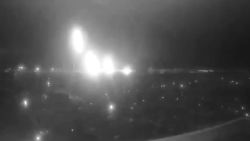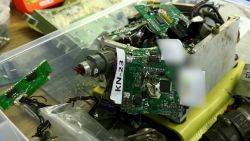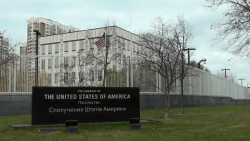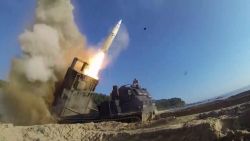Russia launched a new non-nuclear ballistic missile with medium range on Ukraine’s Dnipro region on Thursday, Russia’s President Vladimir Putin said in a televised statement, marking another significant escalation in the 1,000-day-old war.
According to US and Western officials, the ballistic missile carried multiple warheads, which may be the first time such a weapon has been used in war.
At least three people were injured in the attack, the head of the Dnipro’s military administration had said earlier. A number of buildings were also damaged.
Here’s what we know.
What is Russia saying?
Russian President Vladimir Putin said a Russian strike in Ukraine was carried out by a new non-nuclear ballistic missile, which has a medium range.
“In response to the use of American and British long-range weapons, on November 21 of this year the Russian armed forces launched a combined strike on one of the facilities of the Ukrainian defense industry,” Putin said in a televised statement on Thursday.
“In combat conditions, one of the newest Russian medium-range missile systems was also tested,” Putin said, apparently referring to the strike on Dnipro. “In this case, with a ballistic missile in non-nuclear hypersonic equipment. Our missilemen called it ‘Oreshnik.’ The tests were successful. The launch goal was achieved.”
This comes after a US official told CNN earlier on Thursday that Russia used an “experimental medium-range” ballistic missile in an attack on the Ukrainian city of Dnipro.
A medium-range missile can travel between 1,000 kilometers and 3,000 kilometers (620 miles to 1,860 miles), according to the Center for Arms Control and Non-Proliferation.
Putin also said that Moscow considers itself entitled to use weapons against military targets belonging to countries that allow their weapons to be used against Russia. He said that Ukrainian Armed Forces attacked targets in Russia’s Bryansk region with six US-made ATACMS missiles on Tuesday and later fired British/French Storm Shadow systems on the Kursk region.
“From that moment, as we have repeatedly emphasized earlier, the regionally provoked conflict in Ukraine took on elements of a global nature,” Putin said, adding that “using such weapons without the direct involvement of military specialists from the countries that produce these weapons is impossible.”
“We consider ourselves entitled to use our weapons against the military objects of those countries that allow their weapons to be used against our objects, and in the event of an escalation of aggressive actions, we will respond just as decisively and in kind,” he added.
What is Ukraine saying?
Ukrainian President Volodymyr Zelensky said Russia’s use of the new missile is “a clear and severe escalation in the scale and brutality of this war.”
In a post on X on Thursday, Zelensky accused Russia of “a cynical violation of the UN Charter” and taking a “second step toward escalation” of the conflict, adding that the first escalatory step was involving North Korean troops in the war.
The Ukrainian leader also emphasized Kyiv’s right to strike Russia with long-range weapons “under international law,” adding that Putin is “testing” Kyiv’s partners with his actions and called on world leaders to put pressure on Moscow.
“A lack of tough reactions to Russia’s actions sends a message that such behavior is acceptable,” he said. “Russia must be forced into real peace, which can only be achieved through strength.”
Ukraine’s foreign ministry echoed Zelensky’s comments, emphasizing Kyiv’s right to strike Russia with long-range weapons.
“Ukraine has used long-range capabilities against targets in its occupied territories many times, but Putin started to fuss only when targets in Russia were hit. So Putin knows the difference between the actual Russian territory and the territory he tries to steal from Ukraine,” Ukraine’s foreign ministry spokesperson Heorhii Tykhyi said in a Thursday post on ‘X.’
Ukraine’s air force earlier accused Russia of launching an intercontinental ballistic missile at Dnipro at around 5 a.m. local time, from the Astrakhan region of southern Russia, without offering further detail. However, two Western officials disputed Ukraine’s assessment, saying that although the missile launched by Russia was likely a ballistic missile, it was not an intercontinental one.
Ukraine’s military also said that an X-47M2 Kinzhal ballistic missile was launched alongside seven cruise missiles in the attack, adding that all but one of the cruise missiles were shot down. “The other missiles didn’t cause significant consequences,” the military said.
Ukrainian President Volodymyr Zelensky framed the strike was evidence that Putin is “so afraid, he is already using new missiles.”
“Today, our crazy neighbor has once again shown who he really is and how he despises dignity, freedom, and human life in general,” Zelensky said in a video posted to Telegram before Putin’s televised address.
What is an MIRV?
The missile fired at Dnipro carried multiple warheads, according to two US officials and one Western official, in what may be the first time such a weapon has been used in war.
The weapon, known as a Multiple Independently-targetable Reentry Vehicle (MIRV), carries a series of warheads that can each target a specific location, allowing one ballistic missile to launch a larger attack.
MIRVs were developed during the Cold War to permit the delivery of multiple nuclear warheads with a single launch. The Minuteman III, which is the US intercontinental ballistic missile, is armed with MIRVs. The Russian missile attack on Dnipro was not armed with nuclear warheads, but it used a weapon designed for nuclear delivery to instead launch conventional weapons.
Deputy Pentagon press secretary Sabrina Singh said this was the first use of the experimental intermediate-range ballistic missile “based on” Russia’s RS-26 Rubezh missile model, though Singh declined to identify the specific type of missile or its capabilities.
Tom Karako, the director of the Missile Defense Project at the Center for Strategic and International Studies (CSIS), says it’s likely the first time a MIRV has been used in combat.
In the past, MIRVS were “exclusively for nuclear warheads, and everything that’s more tactical is either singular or cluster munitions,” Karako told CNN.
The use of this type of missile armed with conventional warheads is an escalation of Russia’s nuclear saber-rattling, Karako said, which includes the recent update of its nuclear doctrine.
“This is a big rocket with payload capability - presumably MIRVs - and has the baggage associated with it of nuclear delivery vehicles,” he said.
Hans Kristensen, the director of the Nuclear Information Project at the Federation of American Scientists, said the launch was significant. “To my knowledge, yes, it’s the first time MIRV has been used in combat,” Kristensen said.
The United Nations Secretary General’s spokesperson warned on Thursday that Russia’s use of a new, medium-range ballistic missile is “yet another concerning and worrying development.”
“All of this [is] going in the wrong direction. What we want to see is for all parties to take urgent steps to de-escalate the situation,” Stephane Dujarric said in a regular briefing on Thursday, adding that “what we want to see is an end to this conflict in line with General Assembly resolutions, international law, and territorial integrity.”
Why is this significant?
Putin’s announcement comes during a tense week in the conflict, which is now more than 1,000 days old.
This week, both US and British/French-made missiles have been fired into Russia by Ukraine, after US President Joe Biden gave Ukraine permission to use longer-range American missiles across the border.
On Tuesday, Russia’s Defense Ministry and two US officials said Ukraine had fired the US-made ATACMS into Russia for the first time.
Russia’s Defense Ministry also said its air defenses shot down two British/French-made Storm Shadow missiles, acknowledging Ukraine’s use of the longer-range weapons.
In turn, Putin updated Russia’s nuclear doctrine, with the Kremlin saying the revised military doctrine would in theory lower the bar for first use of nuclear weapons.
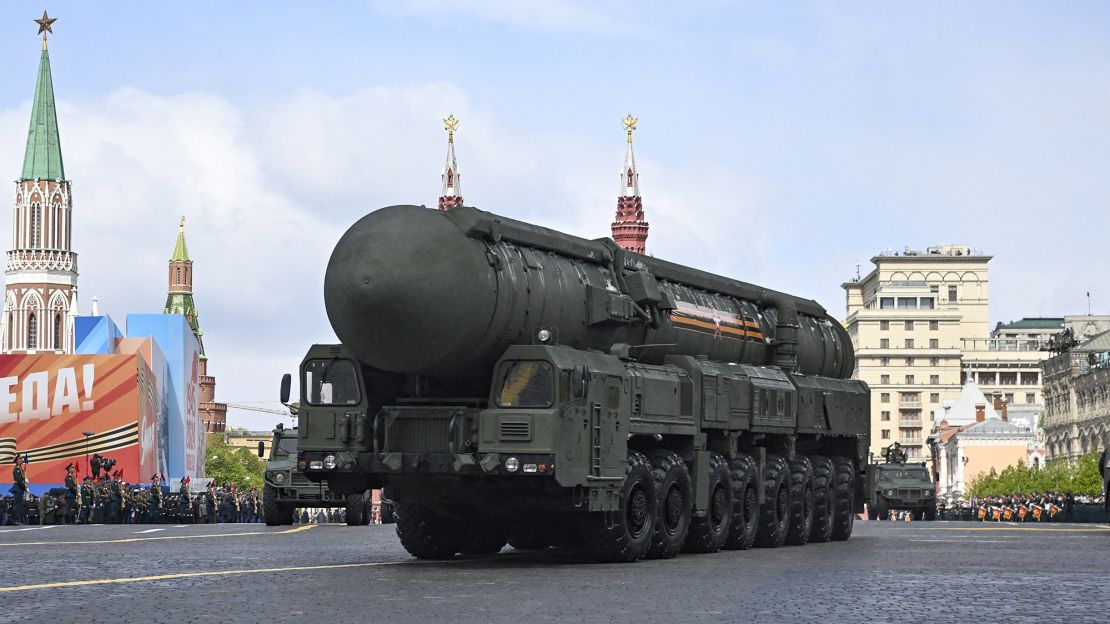
How does Ukraine defend itself?
Ukraine uses a Patriot missile defense system supplied by the US and Germany to intercept incoming ballistic missile warheads, according to the Missile Threat Project at the Center for Strategic and International Studies.
The Patriot system is designed to engage incoming warheads, either with an exploding warhead of its own, or with kinetic interceptors – so-called “hit-to-kill” technology, which destroys the incoming warhead by striking it directly.
Patriot interceptors have a vertical range of about 20 kilometers (12 miles) and defend an area of about 15 to 20 kilometers around the battery, according to the Congressional Research Service.
But Ukraine has only a limited number of Patriots and batteries. Some cities, like the capital Kyiv, enjoy greater protection than others.
Why was Dnipro targeted?
The Dnipropetrovsk region has been a frequent target of Russian bombardment in recent months.
It borders the partially occupied Donetsk and Zaporizhzhia regions and has become a hub for people who have fled areas that are now under Russian control.
The region is now home to more than 400,000 internally displaced people. Dnipro, the fourth-largest city in Ukraine, is an important center of life in the eastern part of the country.
It is relatively close to the front lines, yet still fairly well protected by air defenses. That, plus its transportation infrastructure links to the rest of the country, makes the city a key hub in Ukraine’s war effort.

How much damage did the attack cause?
The head of Ukraine’s Dnipropetrovsk military administration said Russia was “massively attacking” the region on Thursday morning.
Three people were injured after houses were damaged, and a rehabilitation center for people with disabilities was also impacted in the attack, Serhiy Lysak said on Telegram.
There were two fires in Dnipro and “damage to an industrial enterprise,” he added.
This story has been updated with additional developments.
CORRECTION: An earlier version of this story gave the incorrect name for the Center for Arms Control and Non-Proliferation.
CNN’s Oren Liebermann, Natasha Bertrand, Mariya Knight, Caitlin Hu, Zahra Ullah, Tara John, Brad Lendon, Christian Edwards, Anna Chernova, Haley Britzky, Ivana Kottasová, Jerome Taylor, Kosta Gak, Antoinette Radford and Lauren Kent contributed to this reporting.

